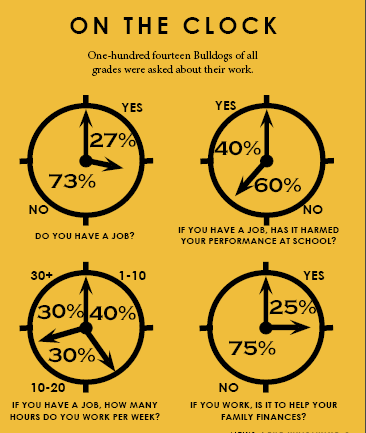WEEKENDS ON: THE BUSY WORK LIVES OF TODAY’S TEENS
While some teens focus on studying and enjoying their free time, others find their limited hours filled with hard work
As the sun sets and teenagers all over Albany dig into their textbooks and worksheets, students like senior Hannah Engom spend their night working.
Like Engom, 35 percent of American teenagers are members of the labor force during the school year, with another 13 percent of teens wishing they were, according to The Atlantic. Rates increase by half during the summer.
With 53 percent of teens also taking summer classes , 60 percent taking a full course load, and many engaged in internships, teens in modern America often find themselves studying at school and working well over 40 hours per week—the official designation of a full time job.
Here in Oregon, restrictions on teenagers working are lower than in other states. Once a teenager turns 16, they are allowed to work up to 44 hours per week.
In other states, teens under the age 18 have limited hours they may work to ensure they balance
their work, school, life, and sleep: but no such laws apply in this state. As such, the number of teens working at least 10 hours per week during the school year is higher here than the national average.
This has its pros and cons: teens develop employable skills, get savings, and can pay more easily for college and other big expenses. However, it also may contribute to higher stress and depression, of which Oregon has a rate well above the national average.
Poorer sleep and health, less time for one’s self, and poorer performance at school may also result when students work long hours. Indeed, this may depress Oregon’s graduation rate, which, at 75 percent, is among the nation’s lowest. Nevertheless, at the community level, working high school students benefit the economy, and future employers appreciate those with hands-on experience.
Here at West Albany, students have responded differently to balancing the challenges and obligations of working as a teenager. Two juniors, Annie Rasmussen and Isabelle Zerr, recently quit their jobs because of it. Rasmussen, who wanted to keep her employer undisclosed, spoke of the erratic schedule being the biggest difficulty with working.
“They only told me when I would work a day or two before,” she said. “Sometimes they would make me work five hours in a week; sometimes they would make me work 25.”
At times, management required her to close as late as 10:30 or 11:00 at night, after which she would have to head home and get homework done. When she told management she needed a more consistent schedule without such late weeknights, they were not receptive and scheduled her to work those hours anyway.
It was hard to maintain good grades and time with her friends with such variable hours. After months of this, she quit her job, choosing to “put school first.”
Nevertheless, she was aware of the benefits the job offered her. Rasmussen claimed work experience was valuable, noting how she learned to work well with others and deal with rude customers. Her paycheck, of course, was important as well, but she does not plan to look for a new job soon.
Zerr told a similar story of her time spent working at a local restaurant. Like Rasmussen, she has a variable schedule—10 to 20 hours per week—including often working eight hours on Saturdays. As a hostess, she spent all her time on her feet except on the particularly long days, when she begged for a half-hour break—which all teenagers working long days in Oregon are legally entitled to.
Indeed, she had to buy special shoes to be up for it—which cost
her $60 —before her job even started. In a similar vein, employees were responsible for purchasing parts of their uniform, and if anything–even a name tag–was lost, they were expected to cover the cost themselves, despite such practices being illegal under Oregon law.
Her employers were sexist and condescending, time for sleep and homework was limited, and her grades were on the
 decline. Employees were expected to jump through elaborate hoops to move up in the staff hierarchy, and as a hostess, Zerr received no tips. After six months there, she decided the paycheck was not worth the cost to other aspects of her life, and she too is not looking for another job soon.
decline. Employees were expected to jump through elaborate hoops to move up in the staff hierarchy, and as a hostess, Zerr received no tips. After six months there, she decided the paycheck was not worth the cost to other aspects of her life, and she too is not looking for another job soon.
“I want to enjoy the end of my time in high school,” Zerr noted, “ because I will be working for the rest of my life.”
Your donation will support the student journalists of West Albany High School. Your contribution will allow us to purchase equipment and cover our annual website hosting costs.









